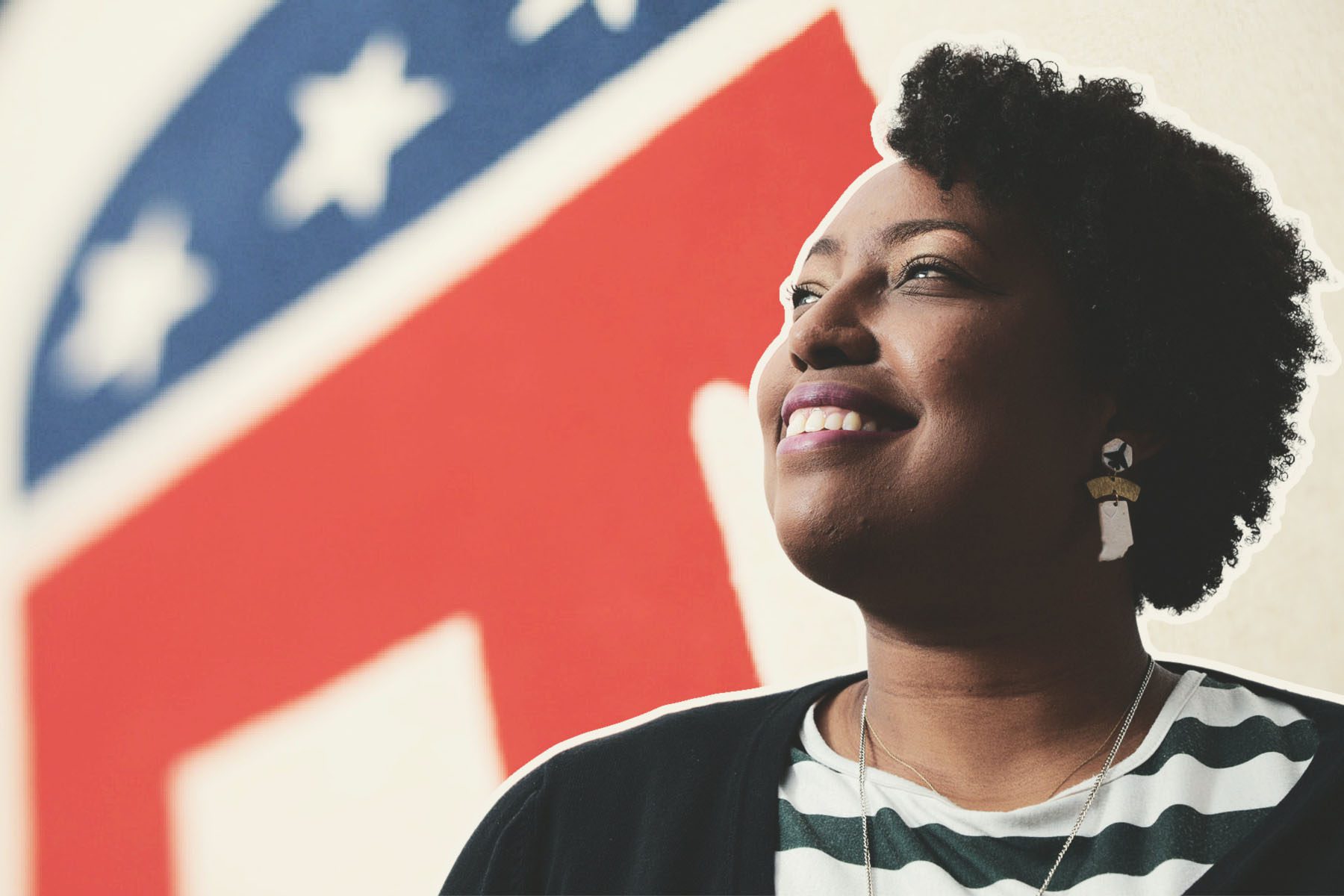We’re making sense of the midterms. Subscribe to our daily newsletter for election context and analysis.
Indiana’s 1st Congressional District is the state’s most diverse and also home to its most hotly contested U.S. House race this year. Voters here could also make history: If they swing to the GOP, they could send to the House their first Republican in nearly 100 years. Their new representative would also be the second Black Republican woman to ever serve in Congress and the first Asian American woman to represent Indiana.
Jennifer-Ruth Green, a frequent guest on Fox News, has raised nearly $3 million in her challenge of first-term Democratic Rep. Frank Mrvan. Green, whose father is Black and whose mother is Filipino, is an Air Force veteran, active-duty National Air Guardsman and nonprofit founder who is campaigning on many of the same issues as other GOP candidates around the country: She’s anti-critical race theory and negative on the state of the economy.
“As a military member and as a conservative, I just saw this clear lack of leadership and I just felt underrepresented,” Green said in a May interview on Fox when asked why she decided to run. “I felt there was great silence. Also, I see that policies are being failed to be enacted and people are suffering.”
While the overwhelming majority of Black Americans are Democrats and the Republican Party’s base is dominated by non-college-educated White voters, every Republican who flipped a House seat in 2020 was either a woman or a person of color. Green is one of six Black Republican women on the ballot Tuesday. Tamika Hamilton is running in California; Aja Smith in California; Carla Spalding in Florida; Cicely Davis in Minnesota; and Charlotte Bergmann in Tennessee — but only Green is running in a district that’s not heavily Democratic.
The 19th spoke to half a dozen experts and academics about the role of women of color in the GOP. The consensus was that while the party has made major gains in the diversity of its elected officials, they are still minimal compared with the Democratic Party. Republican women of color tend to align in values with the current party’s ideology, rejecting identity politics and focusing on the economy and national security — but how they run is different, both because of their race and gender.

Suzanne Chod, a professor of political science and coordinator of gender and sexuality studies at North Central College in Naperville, Illinois, said the Republican Party has worked to run diverse candidates in diverse, flippable districts and has made gains in diversity in Congress — while still trailing Democrats.
“This provides an important narrative for both Republican voters and elites,” Chod said. “It says, ‘See, we elect women and people of color. We are not a white nationalist party; we are a conservative party.’ And this is precisely how Republican women and people of color run. They prove their conservatism and color blindness on issues such as immigration, policing and abortion.”
And the country’s increasing partisan polarization means that while most people who identify as women, people of color, immigrants or members of the LGBTQ+ community lean toward the Democrats, those who lean Republican aren’t likely to be swung by rhetoric or policies that center race or gender.
“Partisanship, and more specifically negative partisanship, drives vote choice,” Chod said. “It is becoming the case that the quality of candidates is almost irrelevant, as we simply vote against the party to which we don’t belong.”
Kelly Dittmar, the director of research at the Center for American Women and Politics (CAWP), noted that Republicans push back against claims that the Democratic Party is the only option for voters who aren’t White men. They will say Democrats are “weaponizing race” to deny minority communities their individuality, she said.
But while Republican women broke records in 2020, there are no Black women represented in Congress, and the number of elected GOP women of color is small. Six Republican women of color hold House seats: Reps. Mayra Flores of Texas; Jaime Herrera Beutler of Washington, who lost in the all-party primary this year; Young Kim of California; Nicole Malliotakis of New York; Maria Elvira Salazar of Florida; and Michelle Steel of California. And these women, Dittmar said, likely have to contend with white nationalist sentiment within their party in a way that previous women of color did not. It’s a movement linked to former President Donald Trump and his campaign’s explicit anti-immigrant, xenophobic rhetoric.
“The regression back to some of these connections and priority of these viewpoints has been different since 2016 — though it was brewing before that,” Dittmar said. “There was permission from the top.”
Black voters have not always been largely Democrats. From the post-Civil War Reconstruction until the late 1920, they predominantly voted for the Republican Party, drawn to it by Christian values, according to Kendra King Momon, associate provost and professor of politics at Oglethorpe University in Brookhaven, Georgia. But after that, they increasingly voted for the Democratic Party, especially as the Republican Party resisted pursuing civil rights.
Yet Duchess Harris, a political science and American studies professor at Macalester College, said it’s important to remember that people of color were moving to the Republican Party in the late 20th and first years of the 21st century, up until Barack Obama was elected president in 2008. Harris pointed to high-profile conservatives of color like former secretaries of state Colin Powell and Condoleezza Rice.
Many of the women of color who successfully run as Republicans have common backgrounds or experiences.
The first Black Republican woman in Congress, Mia Love, was elected in 2014 and served two terms representing Utah. Catherine Wineinger, an assistant professor of political science at Western Washington University, wrote a peer-reviewed article on how Love navigated her race, gender and party. The campaign emphasized the candidate’s motherhood, airing ads featuring her baking cookies with her children. Black women have to emphasize feminine imagery even more than their White counterparts to offset the “angry Black woman” stereotype, Wineinger said.
Many Republican women of color are immigrants or daughters of immigrants: Love was born to Haitian parents; Steel and Kim were born in South Korea; Salazar’s parents are from Cuba; Flores was born in Mexico; and Malliotakis was born to Greek and Cuban immigrants.
Wineinger, author of “Gendering the GOP,” said that women and people of color candidates are increasingly using their race, gender and lived experiences to credential themselves as strong conservatives. Immigrants, for instance, often “emphasize their status to say they pulled themselves up by their bootstraps and continue to push the ‘American dream’ narrative,” Wineinger said.

Republican women of color also tend to be veterans. Of the six Black Republican women still in the running for House seats this cycle, four — including Green — are veterans.
“Black candidates in particular probably face biased expectations that they support defunding the police, so presenting yourself as a veteran helps push back against that,” Dittmar said. “And then for women, it gives them an additional kind of security, strength, and toughness — traits that are particularly gendered.”
Liza Gordon-Rogers, a visiting assistant political science professor at Gettysburg College in its namesake town of Pennsylvania, said Republican women of color tend to push more “traditionally masculine” issues, such as the Second Amendment, the economy and national security.
Green’s campaign is a prime example, Gordon-Rogers said, noting the candidate’s campaign website heavily features photos of combat gear. But at the same time, these candidates have to present themselves as being “good mothers, good wives and religious to connect their lives with standing conservative principles.”
Research has shown that voters perceive women and people of color candidates as more liberal, regardless of their platforms. Republican women of color have to navigate a “kind of balancing act” to combat those stereotypes, particularly when campaigning, Gordon-Rogers said.
“Republican women of color running for office make a concerted, concentrated effort to brand themselves as conservative first, women or people of color secondary to that — trying to dismiss this notion of identity politics and any particular importance their identities might show,” Gordon-Rogers said.
Women of color are good messengers for the Republican Party, Wineinger said — particularly when race or gender are at the forefront. That’s true with the issue of abortion, education and transgender girls’ participation in sports. Conservative Black women in particular are often brought to the forefront when it comes to their stances on critical race theory curriculum in schools, Black Lives Matter and the funding of law enforcement agencies, she added.
When asked about her stance on critical race theory in schools on “Fox and Friends,” Green said she did not believe that “every system is inherently racist.”
“Because if it were, I would not have the opportunity to be a lieutenant colonel in the Air Force and Indiana Air National Guard,” Green said. “I wouldn’t have the opportunity to be a commander. I wouldn’t have the opportunity to be a United States Air Force Academy graduate. So I’m exhibit A, and I present that as a rejection of the notion that CRT is a thought process that’s worth continuing to provide to our K-12 children.”

Wineinger said issues of race and gender are highly salient in American politics right now.
“I think that party leaders themselves and candidates know that there is an advantage to having women and people of color speaking out on these issues,” Wineinger said. “There’s a recognition that having women of color as messengers can actually benefit the party.”
Republican Party leadership, Wineinger said, is first and foremost concerned with winning elections.
“Right now Republicans know that they can win without a multiracial coalition, and I think they are not necessarily trying to appeal to people of color or even to women,” Wineinger said. “I think the goal right now is to win elections, and they know that they can win the base that they currently have, which is White Christians.”






